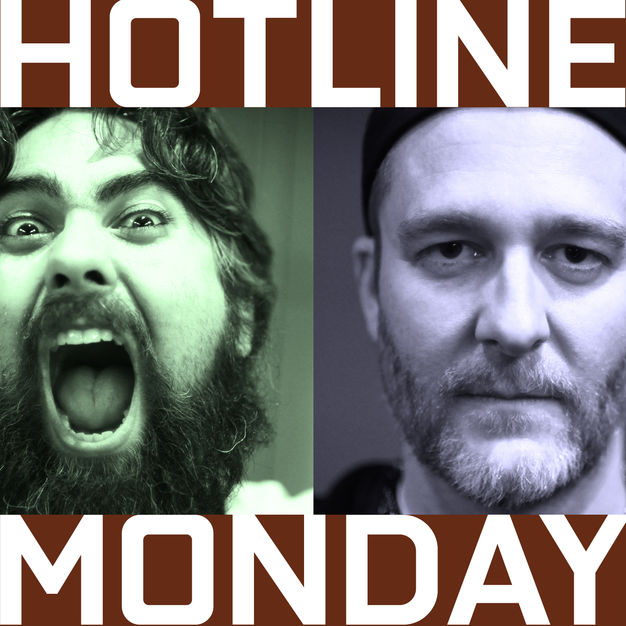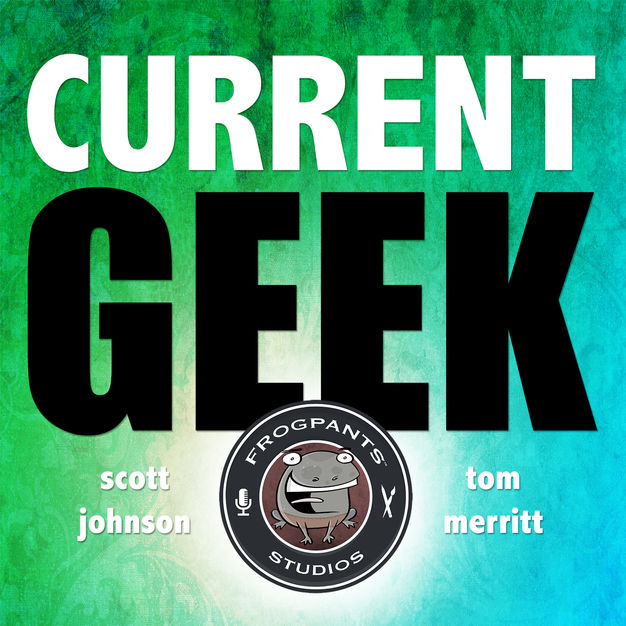
Politics Politics Politics
Justin Robert Young
In a post-Trump world, why are you listening to pre-Trump nonsense? They got you into this! Former Journalist Justin Robert Young cuts to the chase: politics is a game. Do you want to watch it be played or get played by it?
- 41 minutes 3 secondsDonald Trump Inaugurated. Biden Passes Out Nixon Pardons. (with Jen Briney)
Donald Trump is the president of these United States again.
And with it comes a flurry of executive orders that could reshape America.
It’s officially Joe-ver for Biden.
But before it was over he reshaped the concept of American presidential pardon power.
We discuss all of it LIVE from Washington DC with Jen Briney.
Politics Politics Politics relies entirely on your donations to travel the country and cover national politics. Join us, won’t you?
This is a public episode. If you’d like to discuss this with other subscribers or get access to bonus episodes, visit www.politicspoliticspolitics.com/subscribe20 January 2025, 11:03 pm - 58 minutes 10 secondsJimmy Carter Remembered (with Ricardo Fernandez)
Very happy to be joined on the show today by Ricardo Fernandez a doctor from Chicago who happened to become close friends with former President Jimmy Carter.
We discuss:
* Life after the presidency
* Obama’s campaign refusing to let him speak at the 2008 DNC
* How he reacted to his grandson recording Mitt Romney’s “47%” quote
And much more!
Politics Politics Politics is a good show. Subscribe for free right here or upgrade to paid!
Episode Chapters
* [00:00:01] Opening Remarks
* [00:01:19] Introduction to Jimmy Carter Special
* [00:02:00] Ricardo Fernandez
* [00:23:03] TikTok Ban News
* [00:24:46] Joe Biden's Farewell Address
* [00:29:57] Midterm Polling and Other News
* [00:39:59] Jimmy Carter's Final Days
This is a public episode. If you’d like to discuss this with other subscribers or get access to bonus episodes, visit www.politicspoliticspolitics.com/subscribe17 January 2025, 1:46 am - 1 hour 23 minutesDems Bumble Hegseth Hearing. Kamala Harris 24 is STILL Fundraising? (with Jen Briney and Dave Levinthal)
Pete Hegseth is your next Secretary of Defense.
Nothing from Tuesday’s contentious hearing will likely pluck GOP votes away from him. If anything the histrionics of the Democrats on the panel will make it harder for skeptical Republicans to stray.
The way you collapse a nominee when you are in the minority is you give them enough rope to hang themselves. Ask cordial questions that elevate in complexity and hope they screw something up. That is the most likely possibility with Trump’s slate who are being painted as unready and unprepared.
They did not do that.
Instead we got screeds on Hegseth’s personal history, financial management and his opinion of women.
What standing does a Republican Senator have if he is on the side of Sen. Tim Kaine taking the moral high road on infidelity?
That being said, even if the Democrats had played a more strategic hand it looks like the GOP had effectively closed ranks. The lynchpin of a potential washout was Iowa’s Joni Ernst and she spent the first portion of her time discussing the importance of a Pentagon audit (the upside of finding someone from outside the traditional drafting grounds for SecDef since DoD has routinely failed audits) and then played home run derby pitcher on the subject of women in the military.
Yesterday, Hegseth was the most vulnerable of Trump’s nominees. Today, betting markets pin that honor on Robert F. Kennedy Jr. and Tulsi Gabbard.
But if the Republicans are on the same page the Democrats are going to take this seriously, then I would bet on the full slate sailing through.
Also, on the this podcast…
Jen Briney, host of Congressional Dish, joins to discuss the stakes of these hearings and the ideological divides within Trump’s coalition.
Dave Levinthal, the money man, is back to discuss Kamala Harris 24 continuing to charge donors months after losing.
Chapters
* 00:00:00 - Episode Introduction and Live Show Announcement
* 00:01:35 - Pete Hegseth's Confirmation Hearing Analysis
* 00:10:17 - Breakdown of Trump’s Coalition Cabinet
* 00:21:00 - Marco Rubio’s Focus on Foreign Policy
* 00:30:00 - Tulsi Gabbard and Kash Patel: Challenges and Prospects
* 00:43:10 - Upcoming Events and Political Updates
* 00:52:49 - Dave Levinthal
This is a public episode. If you’d like to discuss this with other subscribers or get access to bonus episodes, visit www.politicspoliticspolitics.com/subscribe15 January 2025, 12:00 am - 1 hour 38 minutesThe Emerging Democratic Lanes. What If Trump 2.0 Is Competent? (with Jeff Maurer and Kirk Bado)
Best I can tell there are two emerging Democratic Lanes in our post-Obama era world…
Progressive + Border Hawk
In a bygone era, Bernie Sanders got an “A” rating from the NRA and believed increased immigration was a corporatist scheme to drive down union wages. While, he has yet to reload on his 2A cred, he is now back to beating the drum on the economic costs of immigration. I would suspect that progressives will feel more comfortable consciously uncoupling from positions and groups calling for a decriminalized border.
New Blue Dogs
Arf! Arf! John Fetterman sees a lot of Trump signs when he drives through the state of Pennsylvania. So why should he fight tooth and nail to keep Pete Hegseth from the Pentagon? If he wants to keep his seat in a state that is trending rightward then maybe picking and choosing his battles with the MAGA agenda is smarter than diametric opposition. Maybe it makes more sense to make face in Mar-A-Lago than to march in defiance.
—
Either way we have a lot of spaghetti being thrown at the wall and our friend Jeff Maurer is here to help make sense of it. Including whatever the hell Chris Murphy is up to.
Chapters
4:30 Jeff Maurer
35:05 UPDATE - Carter Funeral, Fetterman to MAL, Trump First Executive Orders
48:51 Kirk Bado
This is a public episode. If you’d like to discuss this with other subscribers or get access to bonus episodes, visit www.politicspoliticspolitics.com/subscribe10 January 2025, 4:05 am - 59 minutes 36 secondsWait, Why Did Justin Trudeau Resign? Meta Ends Fact Check Era (with Evan Scrimshaw and Tom Merritt)
Justin Trudeau, Canada’s long-standing Prime Minister, announced his resignation this week, marking a seismic shift in the nation’s political landscape. Trudeau’s departure comes after nearly a decade as Prime Minister and thirteen years as leader of the Liberal Party. His resignation was not entirely unexpected but has sparked a wave of introspection within Canadian politics.
Here is what you need to know if you don’t care about Canada unless they’re playing hockey or changing heads of state as told to us this episode by Evan Scrimshaw.
The Breaking Point: Why Trudeau Resigned
Trudeau’s decision to step down was a culmination of mounting pressure from within his party and worsening public opinion. In recent months, his leadership faced escalating dissent. A pivotal moment was the resignation of the finance minister, which signaled deep fractures within the Liberal Party. Over the holiday season, Trudeau faced an ultimatum from his caucus—resign or face a vote of no confidence.
Several factors contributed to Trudeau’s plummeting support:
* Declining Poll Numbers: Trudeau’s approval ratings had been steadily eroding, with the Liberal Party polling over 20 points behind the opposition Conservative Party.
* Special Election Defeats: Losing in traditionally strong Liberal ridings signaled waning public support.
* Policy Disconnect: While many of Trudeau’s policies were popular in principle, his personal brand had become a liability. Voters who liked Liberal initiatives often dismissed them outright when they were linked to Trudeau.
Trudeau’s tenure will be remembered as one of bold progressive initiatives juxtaposed with ethical controversies. On the positive side, his government achieved significant reductions in child poverty, lowered carbon emissions, and introduced affordable childcare programs. Yet, his administration was marred by scandals, including:
* Ethics Violations: Pressure on the attorney general to favor a Quebec-based company, SNC-Lavalin, during a corruption probe.
* Conflicts of Interest: Controversies surrounding contracts awarded to organizations with personal ties to Trudeau’s family.
* Housing Crisis: Critics argue Trudeau’s inaction exacerbated Canada’s housing affordability crisis, with rents and mortgage rates soaring during his leadership.
As Scrimshaw put it, Trudeau’s administration embodied “reckless disregard” for ethical boundaries. While these issues might have been survivable individually, collectively, they eroded trust in his leadership.
Trudeau’s resignation has thrown the Liberal Party into a leadership race. He will remain interim Prime Minister until March, with no parliamentary sittings until then. Key contenders for his replacement include:
* Chrystia Freeland, the current finance minister and one of Trudeau’s closest allies.
* Mark Carney, former Bank of Canada and Bank of England Governor.
* Anita Anand, Minister of National Defence.
* Other candidates, including Francois-Philippe Champagne, Dominic LeBlanc, and former B.C. Premier Christy Clark.
The party faces a critical choice: selecting a leader who can halt its decline and prepare it for the next general election. Scrimshaw warns that without decisive leadership, the Liberal Party risks being overtaken by the New Democratic Party (NDP) or marginalized altogether, as seen historically with the UK’s Liberal Party being replaced by Labour.
As Trudeau exits, the Conservative Party, led by Pierre Poilievre, appears poised to seize power in the next election. Poilievre, a pragmatic and relatively moderate conservative, has maintained focus on fiscal discipline while distancing himself from extreme social conservatism. The scale of the Conservative victory—whether narrow or overwhelming—will shape the trajectory of Canadian politics for years to come.
Trudeau’s political obituary is one of contrasts. He entered office as a symbol of youthful energy and progressive ideals, but over time, his administration became a cautionary tale of hubris and ethical lapses. His departure offers an opportunity for renewal within the Liberal Party and Canadian politics at large. Yet, the path forward is fraught with challenges, as the party grapples with its identity and viability in a rapidly shifting political landscape.
Chapters
Opening and Introduction (00:00:00–00:00:45)General overview of topics, including Trudeau’s resignation, Zuckerberg’s changes at Meta, and upcoming political discussions.
The Revival of Government (00:00:45–00:01:25)Commentary on the return of political activity in the House and the Trump administration’s cabinet hearings.
Justin Trudeau Resigns (00:01:25–00:08:45)A detailed discussion of Trudeau’s resignation, his legacy, and the future of the Liberal Party.
Global Political Trends and Liberal Party Risks (00:08:45–00:12:15)Insights into parallels between Canadian and UK politics, the Liberal Party’s identity crisis, and risks of being overtaken by the NDP.
Future Leadership of the Liberal Party (00:12:15–00:14:22)Breakdown of potential leadership candidates and their implications.
Conservatives' Prospects and Pierre Poilievre (00:14:22–00:21:57)Analysis of Poilievre’s leadership style and the Conservative Party’s likely dominance in the next election.
Discussion with Tom Merritt on Meta (00:39:00–00:41:07)A conversation with Tom Merritt on the implications of Meta's changes for political and social discourse.
The Trump Administration’s Strategy (00:26:23–00:29:56, 00:42:00–00:49:20)Overview of Donald Trump’s legislative plans, reconciliation tactics, and the challenges facing the House and Senate.
This is a public episode. If you’d like to discuss this with other subscribers or get access to bonus episodes, visit www.politicspoliticspolitics.com/subscribe8 January 2025, 12:12 am - 45 minutes 59 secondsOne Trick Pony From A One Party State: Campaign Undertaker Claims Harris '24 (with Andrew Heaton)
Kamala Harris is the American High Speed Rail candidate.
Very expensive. Popular with liberal city dwellers. But ultimately a lot of hype that leads to very little.
While she isn't necessarily a poor candidate in every context, she struggled twice on the national stage with median voters first within and then outside of her party.
I’m not going to do a blow by blow of her campaign because this is a eulogy and eulogies are broad. So let’s start here:
Kamala Harris is from California. Not a bygone version of California. Not Ronald Regan’s California. Not Roger Rabbit’s California. The California over the last two decades. One that saw the rise of San Francisco as a financial and cultural hub AND post-pandemic has become synonymous with progressive failure.
That California.
If you are a California politician the first decision you need to make when explaining yourself to the nation is: does California suck right now or not?
If you say it sucks, then you explain how your beloved home state has fallen victim to the plight of the modern world. Blame capitalism, blame a lack of morals, decry the spread of drugs… if you want to get spicy, blame local or state government.
Or you can decide California is great actually, blame the media for spreading a distorted image.
Kamala Harris did neither. The only time she mentioned California was in her backstory. Oakland was a prop. But for Presidential candidates, your past is your governing philsophy. And I don’t mean the bullet points she’d recite, (did you know she prosecuted trans-national gangs?) I mean your leadership.
Are you a head cracker? Are you a unifier? Are you a turnaround artist? Are you a technocrat?
With Kamala, we got a little bit of everything. Which means we got nothing.
And I’ll give credit to her campaign staff, who I didn’t think did a great job, because I don’t know that they had much to work with.
Kamala Harris lacks dynamism and appeals to a limited audience.
She is a highly-touted college quarterback who underperforms in the pros. Based on their initial promise they get a second shot on another team only to be terrible there too. Why do we think the third time is the charm?
She emerged from her tenure as San Francisco Attorney General as a let’s-enforce-the-laws liberal and was lauded for it. By the time she became California AG she had liberal wins to notch including legalizing gay marriage.
Her election to Senate from the one-party state while impressive for her resume is not indicative of someone with political skill or campaign savvy. Her early wins say more about her than anything that came after because California was on the ascendancy after that. The nation was begining to agree with positions California had taken in the last century: specifically on marijuana and LGBT freedoms. The tide rose and her boat with it.
But to be clear: she’s a system product. An assembly line politico. Sleek and shiny but quite possibly purposeless.
We saw this when she leaned into progressive messaging while running for president in 2020, it backfired. Some blamed this on her embracing "woke" politics or poor advisers, but the real issue was deeper: she's never had to dig deep and find a compelling version of herself before. She certainly didn’t find it in 2019.
True authenticity emerges when voters believe in a politician's core identity—even if they disagree with their views. They sense an underlying worldview driving the candidate forward. Bill Clinton, Barack Obama, and Donald Trump all possessed this quality. Harris notably lacked it, exemplifying a broader Democratic Party tendency to believe messaging alone can solve fundamental problems. No amount of messaging could separate Harris from her identity as a politician from America's most progressive state. And she can’t explain it as a stregth or distance herself from it as a weakness.
She's not a poor speaker— just uninspiring. Unlike George W. Bush, who wasn't particularly dynamic but clearly stood for something, Harris never conveyed a sense of deep conviction.
Without conviction, you can't win. You need to spark something in swing voters or motivate your likely supporters to actually turn out. Without that spark, you have nothing.
This is all compounded by the fact that she was dealt a tough hand. This is the second visit the Campaign Undetarker has made to the Democratic Party this cycle. President Joe Biden drops out before the convention, admitting to America that they’d reject him and the job he’d done as president.
And in the late summer, Kamala faced a tricky choice. How do you handle Joe?
She decided not to.
Okay, allow me one bit of back seat driving for the campaign.
In my opinion, her only viable path forward would have been resigning the Vice Presidency. She could have done this gracefully—simply stating she wanted to pursue her own vision of government. Would it have left the Biden Administration scandalized? Yes. But that’s happening anyway. Why tie yourself to the mast of a sinking ship when you have a chance to win the presidency? This would have distinguished her from the administration without directly criticizing him. Now when she dodged she could always point to her sacrifice which would speak louder than any second guessing.
The fact that this option wasn't seriously considered reveals how Democrats misread the situation. They treated her like an interchangeable part, failing to recognize that when crafting a multi-year national narrative, you can't take voters for granted. The audience isn’t dumb. Shape the story how you want, they’re not slow.
You need to be alive. You need to be vital.
Only bold moves could have saved her. Instead, we got a rehash of post-Obama Democratic presidential campaigns: celebrity endorsements, polished interviews, and rigid talking points. Not a speck of humanity in sight.
When you're trailing by 30 points, you need to get aggressive. You need to try every strategy possible. If you're not willing to think creatively, what's the point?
But this isn’t simply a eulogy. No, this is a prelude.
In politics, what is dead may never die.
I believe Kamala Harris is the next governor of California and I think she might be popular. California might be the only state that would realistically think of Kamala as a centrist. She will have the political clout to do otherwise unpopular things that will be quality of life improvements to the citizens. She could go back to the style that suits her the best: Kamala the Law and Order Liberal.
To use a football analogy. Mac Jones was a good quarterback in college at Alabama but has been mediocre on two NFL teams. But what if he could go back to college? There is every reason to believe he’d be awesome.
Same for Governor Harris.
But if she decides to run for president again? I’ll be saying the same thing I said in 2019. The same thing I’m saying now. If she runs for president a third time, her ambitions will…
REST IN PEACE
Chapters
* (00:00:50) Introduction: Setting the Stage for 2025 Politics
* (00:01:17) Kamala Harris's Presidential Eulogy
* (00:13:23) PAX MAGA: Republican Dominance in the 2024 Election
* (00:18:03) Biden’s Legacy and Party Dynamics
* (00:26:03) Reflections on Election Predictions
* (00:40:01) Closing Thoughts: The Path Ahead
This is a public episode. If you’d like to discuss this with other subscribers or get access to bonus episodes, visit www.politicspoliticspolitics.com/subscribe3 January 2025, 3:21 am - 1 hour 33 minutes2024 Year In Review (with Kevin Ryan)
January
Alec Baldwin was indicted on January 19th for involuntary manslaughter following the 2021 shooting on the set of Rust that killed cinematographer Halyna Hutchins. Although later cleared due to prosecutorial errors, Baldwin returned to public life, including participating in Saturday Night Live.
February
Mitch McConnell announced on February 28th that he would step down as Senate Republican leader, marking the end of the longest tenure in modern history for that role. This transition sets him up for a two-year lame-duck period as a regular senator while John Thune steps in to assume leadership .
March
Vladimir Putin was reelected for a fifth term as Russia’s president during elections held from March 15th to March 17th. The election results, claiming an implausible 110% turnout, highlighted the pervasive control and propaganda of his regime .
April
The total solar eclipse on April 8th captivated viewers across its path of totality, including in Austin, Texas, where a last-minute clearing of clouds created a breathtaking experience. For many, it was a rare opportunity to witness such a celestial event in perfect conditions .
May
The historic coronation of King Charles III took place on May 6th, marking the first such event in 70 years since Queen Elizabeth II. This regal ceremony was watched worldwide, emphasizing the continuation of Britain’s monarchy .
June
The 80th anniversary of D-Day was commemorated on June 6th with major ceremonies in the UK and France, celebrating the historic Allied invasion of Normandy during World War II. The event was marked by political controversies, including UK Prime Minister Rishi Sunak leaving early to campaign, and a tense moment where President Joe Biden faced direct questions about his family .
July
Senator Bob Menendez was convicted in July, involving allegations of accepting gold bars and money from Egyptian sources. His case highlighted corruption scandals and attracted significant media attention .
August and September
We skipped to discuss God.
October
Former President Jimmy Carter celebrated his 100th birthday in October, marking a historic milestone for the elder statesman. His centennial was widely celebrated, highlighting his long-standing contributions to public service and humanitarian efforts .
November
The U.S. election dominated November, alongside a significant ceasefire agreement between Israel and Hezbollah. Both events marked critical geopolitical and political moments in a year filled with transformative events .
This is a public episode. If you’d like to discuss this with other subscribers or get access to bonus episodes, visit www.politicspoliticspolitics.com/subscribe27 December 2024, 10:12 pm - 1 hour 44 minutesEverything I Know About The Shutdown Vote. Trudeau Days Numbered? The Demographic That Won 2024. (with Evan Scrimshaw and Musa al-Gharbi)
We are getting a government shutdown for Christmas! Or Hanukkah!
Here’s what happened and what might come next.
On Thursday night, a vote on a continuing resolution was taken, which some viewed as 1) a stunning rebuke to Donald Trump 2) raising fears of a shutdown.
The first claim is almost certainly incorrect, and the second is possibly wrong.
Last minute gift idea! Get yourself a subscription.
The root of the conflict lies in the Republican House conference’s inability to unite behind ANY Continuing Resolution to fund the government. There are a handful of Reps that simply don’t vote for them. Ever. For anyone.
This is not a problem for the Democrats who do not have fiscal hawks in their ranks. It’s just a part of the game.
But Speaker Mike Johnson needs to pass a CR. So he has no choice but to negotiate with Democrats. But they know that he knows that they know he needed their support. Sensing leverage, Democrats demanded extensive concessions, transforming a slim resolution into a sprawling 1,500-page bill resembling an omnibus. Republican leaders, frustrated by being excluded from these negotiations, learned details of the bill from lobbyists who had inside knowledge.
The situation intensified when media narratives blamed Trump and Elon Musk for killing the bill. In reality, internal GOP dissension doomed the Quasibus CR as soon as the text hit the internet. It would have died when it went to a vote.
Did Trump and Musk accelerate its collapse and prevent a vote? Sure. But it woke up dead. It was never happening.
Trump’s Truth Social missives did set a new course, advocating for a clean continuing resolution with disaster relief and other GOP priorities while proposing a two-year suspension of the debt ceiling—a strategic move to avoid draining political capital on recurring debt ceiling battles. Specifically the Trump tax cuts which are a top priority in 2025.
House conservatives, especially fiscal hawks like Ralph Norman, Chip Roy, and Thomas Massie oppose eliminating the debt ceiling (a key Republican cudgel when Dems run things) unless there are other massive spending cuts to go along with them. Their resistance in the Rules Committee prevented the bill from advancing traditionally, forcing a long-shot vote requiring a two-thirds majority on Thursday night, which was never realistic.
GOP leadership permitted the vote anyway to gauge opposition and explore potential concessions.
To put simpler, the bill that failed last night was always meant to fail. The question was by how much and who would vote no. One GOP House staffer expressed to me that more rock ribbed conservatives that talk a big game about government spending voted to suspend the debt ceiling than he would have guessed.
Looking ahead, the bill will likely shrink more, possibly making the debt ceiling provision more palatable. If Johnson can flip one of the three hardliners on the Rules Committee, a party-line vote might succeed. Alternatively, a few Democrats might cross over, given the approaching holidays and the general desire to avoid a government shutdown.
However, if the government does shut down, the practical impact could be limited since most federal employees would still receive holiday paychecks. Political fallout, however, would be inevitable, with intensified pressure to strike a deal after the new year.
Despite the chaos, some GOP insiders view the vote as more promising than expected. Though 33 Republicans voted against the resolution, party leaders seem cautiously optimistic. If Trump and key Senate allies like J.D. Vance begin actively whipping votes, a slimmed-down resolution could pass. The next steps remain uncertain, hinging on whether enough conservatives can be persuaded to compromise in the days ahead.
Or we shut down and reload for the new year as Trump 2 begins as Trump 1 ended: messy.
Chapters & Timecodes
* [00:00:00] Introduction and Upcoming Topics
* [00:01:59] U.S. Government Shutdown and Congressional Infighting
* [00:12:02] Trudeau’s Political Crisis in Canada
* [00:49:19] Musa Al-Gharbi on U.S. Electoral Trends
This is a public episode. If you’d like to discuss this with other subscribers or get access to bonus episodes, visit www.politicspoliticspolitics.com/subscribe20 December 2024, 3:24 am - 1 hour 17 minutesIs Kamala Harris a Favorite for 2028? (with Bill Scher)
I don’t think Kamala Harris will ever be president.
I don’t think she has a connection with Americans beyond a core Democratic base who can be easily woo’d by another shiny object. I think she would do best in the one-party state she came from and run for governor of California where she might even pass for the centrist she positioned herself as nationally.
But I may well be wrong. If I am Bill Scher will have told me otherwise.
He believes she enters our four-year cycle to select the next president as the most well positioned Vice President loser in recent American history.
Damning with faint praise? Maybe.
We discuss 2028 and everything we got wrong about the election in this chat!
Chapters:
00:00:00 - Introduction and Overview
00:03:06 - Bill Scher on 2024 Election Insights
00:15:01 - Trump’s Continued Popularity
00:40:02 - Trump’s Lawsuit Against Iowa Pollsters
00:45:02 - House GOP Budget Standoff
00:46:47 - AOC’s Leadership Challenge in Congress
00:50:09 Handicapping 2028 Contenders
This is a public episode. If you’d like to discuss this with other subscribers or get access to bonus episodes, visit www.politicspoliticspolitics.com/subscribe17 December 2024, 11:15 pm - 1 hour 10 minutesHunter DeButts Mystery SOLVED? Media, Ego and Trump 2.0 (with Chris Cillizza)
I’m diving deeper into DeButts.
Yes friends, there’s been a crack in the DeButts case.
To recap, on December 3rd, Anna Navarro tweeted that Hunter DeButts, the brother-in-law of Woodrow Wilson, was pardoned. This is not true. There is no historical record of a Hunter DeButts connected to Woodrow Wilson, and Wilson certainly did not pardon him. Navarro later admitted this was incorrect, blaming a ChatGPT search result.
However, nobody could recreate the exact hallucination she posted, and the citation icons in her screenshot resembled an outdated ChatGPT interface.
Curious, I discussed this with Andrew Mayne, my co-host on The Attention Mechanism, a podcast about AI. I also asked listeners to try replicating Navarro’s prompt in ChatGPT. Shortly after, I received an email from a listener named Bret, who provided screenshots showing that while he got the same initial answers Navarro referenced—Bill Clinton pardoning Roger Clinton and Donald Trump pardoning Charles Kushner—Hunter DeButts was nowhere to be found.
Brett’s search led to a site called living.alot.com, which featured a listicle titled “Five Presidents and Governors Who Have Pardoned Family Members.” Interestingly, this article was last edited on the same day Navarro tweeted. My next move was to contact the article’s supposed author, Ron Winkler. However, the author photo appeared unmistakably AI-generated, suggesting the entire article was likely created by a generative AI model.
Investigating further, I found that living.alot.com is owned by Inuvo.com, an ad-tech company specializing in AI-driven marketing solutions. This suggested that the hallucination might not have come from ChatGPT itself but from living.alot.com, an AI-generated listicle site, possibly due to SEO optimization targeting AI-driven search engines. If ChatGPT search pulled from this listicle, it would explain the strange result Navarro saw.
Speculating further, it seems plausible that Inuvo.com, focused on generating ad revenue, might have tweaked its content after seeing traffic driven by the controversy to avoid being de-ranked or blacklisted by search algorithms. Bret’s recreation of almost the exact same search result strengthens this theory.
If anyone at OpenAI working on ChatGPT Search is reading, I recommend a hard look at de-ranking or blacklisting the alot.com suite of sites. The credibility of search-powered AI depends on filtering out such low-quality content.
In the end, the mystery of Hunter DeButts appears to be a hallucination generated by an ad-tech company leveraging AI-driven SEO tactics.
Navarro’s strange ChatGPT result wasn’t directly ChatGPT’s fault—it was fed a falsehood generated by a content-churning AI.
And with that, the Hunter DeButts saga is solved.
All’s well that ends well.
Chapters & Time Codes
* (00:00:00) Introduction: Media, Politics & New Ventures
* (00:01:20) Unmasking the Hunter DeButts Hoax
* (00:15:01) Political Shifts: Murkowski and Ocasio-Cortez
* (00:17:27) Government Shutdown Negotiations
* (00:20:26) Chris Cillizza
This is a public episode. If you’d like to discuss this with other subscribers or get access to bonus episodes, visit www.politicspoliticspolitics.com/subscribe13 December 2024, 4:58 am - 1 hour 29 minutesWhat Happened In Syria and What Happens Next. The Hunt for Hunter DeButts. (with Andrew Mayne and Ryan McBeth)
This episode includes a serious, hour-long discussion with Ryan McBeth on Syria, Iran, Lebanon, Israel and everything in between.
AND
We dive deep into this tweet…
Of course, on December 24, 1917, President Woodrow Wilson issued the controversial pardon for his brother-in-law, Hunter DeButts, convicted of arms smuggling during World War I.
DeButts, married to Wilson’s sister-in-law, Alice, was sentenced to 15 years after British intelligence exposed his fraudulent shipping scheme. Though furious, Wilson faced mounting political pressure amid war preparations. The White House cited new evidence suggesting DeButts was manipulated by foreign spies, and critics accused Wilson of nepotism, while supporters framed the pardon as holiday clemency. After his release, DeButts vanished from public life, reportedly living quietly in Cuba until his death in 1933.
Except. Wait a minute. What you just read, isn’t true.
I fabricated it by directing ChatGPT using Model 4o with the Mac app to make up a fictional reason why Hunter DeButts received a pardon from Woodrow Wilson.
Because Hunter DeButts never received a pardon from Woodrow Wilson.
Hunter DeButts did not marry Wilson’s sister.
Nor did he receive a pardon.
There are other Hunter DeButts involved with Wilson or that time in history.
And yet, Anna Navarro tweeted about it. Upon a simple Google search Navarro wound up getting serially dunked on as people realized very quickly something wasn’t accurate.
And so Anna Navarro posted the following explanation:
She blamed ChatGPT’s hallucinations.
Oh, well. We’ve all been there.
But have we?
While conservatives dunked on Navarro even further for believing ChatGPT, I am here to tell you, as a reporter through and through, I don’t know if ChatGPT hallucinated this. And really, I am following the research of my friend, Andrew Mayne, who first sent this to me and said, he could not replicate the Hunter DeButts answer on any ChatGPT model. Not 4o, not any model that is available, and specifically was available to Navarro on December 2nd.
Now, here’s something that you guys might not know about large language models: they are fairly replicable. You can get similar answers based on similar questions. It’s not exact, but a hallucination is something that you should be able to recreate. It would be odd if you couldn’t.
And my friend Andrew should know. He worked at OpenAI. He was a science communicator. He made a lot of videos that demonstrated OpenAI products up to and including ChatGPT itself and is known as the first prompt engineer for that company. He spent a lot of time with these models.
And with that, I went down my own reporting rabbit hole. Because one of the other things is that the screen grab that Anna Navarro showed was a ChatGPT search that had web results.
See those little brackets with quotes in between them. Those would be annotations. Theoretically, you could click on them and they would bring you to a webpage that would show you where ChatGPT got this information.
What’s odd about it is that those are not the annotations that ChatGPT uses now. And they certainly were not used on December 2nd when Anna Navarro said that she did this search.
So where’d she get it? What version of ChatGPT is she using? And what large language model is going to be the origin story of dear sweet DeButts?
I had a theory.
Let’s say you’re not particularly tech-savvy, if you don’t know exactly what ChatGPT is or OpenAI is, then it is very easy, as ChatGPT has become more and more popular, to just go into the iOS app store and find a lot of — I’m going to call them copycats.
What they really are are other apps that are using the ChatGPT API, but they do a skin on top of it and they often charge you a subscription service.
Do not use them.
But I did because my theory was that Ana Navarro was using one of these apps, one of these apps that are not using similar if not exact user interface the official ChatGPT app is. Maybe they are using those old annotations?
All is revealed!
We get to the bottom of DeButts, on this episode of the Politics Politics Politics.
This is a public episode. If you’d like to discuss this with other subscribers or get access to bonus episodes, visit www.politicspoliticspolitics.com/subscribe11 December 2024, 12:13 am - More Episodes? Get the App
Your feedback is valuable to us. Should you encounter any bugs, glitches, lack of functionality or other problems, please email us on [email protected] or join Moon.FM Telegram Group where you can talk directly to the dev team who are happy to answer any queries.
 Hotline Monday
Hotline Monday
 UNFRIEND ME
UNFRIEND ME
 Current Geek
Current Geek
 The Morning Stream
The Morning Stream
 JuRY
JuRY
 Night Attack Audio Feed
Night Attack Audio Feed